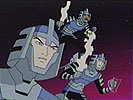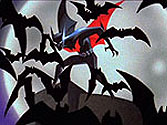|
 Okay,
you and I are fanboys, right? I mean, obviously I am, or I wouldn't have
this web-site. And the fact that you're here is a pretty good indication
that you are too. Go ahead, say it out loud—it's nothing to be ashamed
of. "I am a fanboy." There now. Doesn't good, honest self-confession
leave you feeling better? Okay,
you and I are fanboys, right? I mean, obviously I am, or I wouldn't have
this web-site. And the fact that you're here is a pretty good indication
that you are too. Go ahead, say it out loud—it's nothing to be ashamed
of. "I am a fanboy." There now. Doesn't good, honest self-confession
leave you feeling better?
Now lean closer while
we exchange further confidences. You don't like "Sentries of the
Last Cosmos" much, do you? Of course, you've probably been outspokenly
honest with this opinion elsewhere. Which is fine, too—the typical
fanboy is almost offensively honest about his dislikes. But have you been
honest with yourself (never mind with others) about why you don't
like it? Probably you've said it was poorly animated (true), with lackluster
designs (also true), and was far too derivative of Star Wars (gawd,
how true). But I'm asking you to admit to the deep, dark fact of the matter.
(You can whisper it, if you like, because it's an embarrassing admission
to have to make.) You don't like it because. . . it makes fun of fanboys.
Stings, doesn't it?
Fanboys may know the words to every Monty Python routine (I've been busy
teaching them to my little friend Eric the Half-Bee), but about themselves
they are famously humorless. Oops, that's another hurtful confession,
isn't it? I mean, we laugh at Comic Book Guy, and Doug and his friends
on The Simpsons. But c'mon, it hurts a little, doesn't it, to see
ourselves skewered so perfectly? We can't say we don't like The Simpsons,
because it is so obviously the work of genius. But "Sentries,"
as noted, is not genius, and so we can safely deliver that devastating
old standby: "Worst episode ever!" I only ask that we be honest
about our reasons for hating it.
Now, I've made a
big deal about honesty here because it's a lack of honesty is that is
the fatal flaw in "Sentries." Though the episode is full of
contempt for fanboys, it refuses to admit this fact and even panders to
them as it denigrates them. Unsparing self-honesty is good for the soul,
but it is a positve necessity if a satire like this is to be successful.
Satire works by diminishing
its characters, by revealing their weaknesses in pitiless detail. And
none of the characters in "Sentries" emerges with any credit.
Not Simon Harper, the greedy, backstabbing businessman and exploiter of
fanboys dreams; nor Eldon Michaels, the sloppy, übergeeky creator
of the "Sentries of the Last Cosmos" videogame; not least, the
stupefyingly credulous Corey and his pals—slack-jawed gameplayers
whose inability to distinguish fantasy from reality would be poignant
in a Spellbinder episode, but which here is merely pathetic.
The problem is not
that the characterization of Corey and his fellow fanboys is fundamentally
inaccurate, or that it's too easy and stereotypical. If we're going to
be honest with and about ourselves, we must admit that there are grounds
for this kind of caricature. But the implication of this caricature is
that there's something wrong with the deep identification Corey feels
for the game; anyone who can be so easily led astray, we feel, is already
probably lost. That, at any rate, is the point of the revelation that
he and his companions were taken in by a clever criminal, and presumably
that is what Corey and his pals should have taken away from that revelation,
too.
So why in the name
of Yoda and all that is Jedi do they seek out Eldon Michaels at the end
of the episode? Clearly because, having wasted their time sitting worshipfully
at the feet of a false "Wise One" they are now ready to sit
worshipfully at the feet of a true one. But wasn't the lesson that they
shouldn't be sitting worshipfully at the feet of any "Wise One"?
The body of the plot made them out to be thundering nitwits; since they
emerge from that adventure none the wiser, the seeming implication is
that their obsession with "Sentries" has permanently blighted
their intelligence.
Well, maybe it has,
and it would be an interesting (and mordant) satire that argued it was
so. Instead, this one panders to its targets by granting the benighted
Corey and his companions their wet dream—direct and unimpeded access
to the creator of their obsession—and dishonestly pretends that this
is a happy ending. It's as if Spellbinder's victims in "Hooked Up," once freed from his illusions, had eagerly returned
to lap up more of them, and as if we were encouraged to be pleased with
this turn.
The dishonesty here
is of a piece with the episode's dishonest treatment of the villain. Simon
Harper is a businessman, the financier who backed Michaels' game and then
got stickyfingered with Michaels' credit and share of the profits. The
plot of "Sentries" here mirrors not Star Wars but Tron,
yet it takes a more complicated view of the villain than does the Disney
movie. There, Dillinger cared only for money and power and nothing for
the games and programs he lifted; were he transported into the grid he
would certainly be mortified to find himself doubled as MCP's "Sark"
sidekick. But in "Sentries" Harper revels in the game's gadgets
and mythology and takes genuine pleasure in playing "Wise One"
to his pawns—at least as much pleasure as Corey takes in being a
pawn. So at the end, to Terry's query about Harper's motives, Wayne cannily
observes that "It's not easy giving up being a god."
But let's think through
the implications here: It's not the cashflow that moves Harper, but the
ownership; he lusts not for the wealth the game generates, but the glory
of being able to say, "This is mine." As much as Corey, then,
Harper loves the "Sentries" universe; as much as Corey, he wants
to be part of it, and to play a role within it. But we should recognize
that this is not a businessman's attitude. It's the attitude—and
this is going to hurt to hear—of a fanboy.
Such a claim won't
be welcome to the fanboys out there who think of themselves as the artists'
natural ally against the mercenary corporations that finance them. But
a moneyman doesn't care about credit and artistic authorship; if he interferes
with the product it is for solid capitalistic reasons (audience appeal
and the like) and is therefore likely to be relatively unintrusive as
long as he trusts those doing the actual creating. (Though the chances
are he doesn't trust them very far at all.) But the mogul who genuinely
loves the property, and who tries to mix his own labor into it, is acting
like a fan, and is using his position to act out the fanboy's dream of
contributing to the fantasy universe he loves. In doing so, he tyrannizes
the artist-author as a rival god-creator, and will eventually find himself
drawn to the fanboy's ultimate solution: Eliminate the artist-author altogether
and assume ownership and authorship of the created universe for himself—just
as Harper does.
Only a businessman-fanboy
would be in a position to act out this lunatic desire (as the Adam West
fanboy chairman of Warner Bros. did as he gradually imposed a campy sensibility
on the movie series). But the impulse is easily recognizable in the phenomena
of fan-fiction and in those fiercely sectarian quarrels about what aspects
of a fantasy universe are "canonical." The former represents
the fanboy's attempt to add something of his own to the fantasy and thereby
make it a little bit his own, and it is a (mostly) benign impulse because
it adds to the whole. Not so the latter, which amputates whole chunks
off. Fanboy attempts to deny authoritative status to certain parts of
the fantasy universe (assertions, for example, that Batmite or Ace the
Bathound is not "really" part of the Batman universe) are entirely
disruptive and dictatorial and trespass on the right of the artists and
authors to develop that universe as they see fit. The only "real"
universe these fanboys allow is the one that they are willing to recognize,
which is just to say that they are acting out the role of creator, decreeing
which parts are "real" and which parts aren't.
As I say, it's a
hard thing to have to admit: Harper-as-fanboy is the real villain of "Sentries,"
not Harper-as-businessman. But it's a point that the episode, having made,
tries to elide. That, at any rate, is a further function of that "happy"
ending: it's good to bring fanboys and creators together, it implies.
Never mind that Michaels was almost murdered by the last delusional fanboy
(Harper) he got entangled with, and never mind that Corey and his friends
(as discussed above) are too weak-minded to be trusted. The picture of
a Wise One lulling his admirers with stories of places long ago and far
away is obviously calculated to flatter the fanboys in the audience with
the conceit that they have the right to place burdensome demands on the
storyteller and that the storyteller is (or ought to be) only too happy
to oblige them.
The storyteller-fanboy
relationship, as illustrated in "Sentries," is one fraught with
the danger of exploitation, a fact hard for the average fanboy to accept.
Had the episode the courage of its convictions and called Corey and Harper
for what they are—the kind of creeps Harlan Ellison gleefully eviscerates
in his essay "Xenogenesis"—it would have been unpalatable
but respectable; perhaps even necessary. Absent that honesty, it's reduced
to talking out of both sides of its mouth, abusing its audience while
pretending to flatter them.
|

 Sentries
of the Last Cosmos
Sentries
of the Last Cosmos Okay,
you and I are fanboys, right? I mean, obviously I am, or I wouldn't have
this web-site. And the fact that you're here is a pretty good indication
that you are too. Go ahead, say it out loud—it's nothing to be ashamed
of. "I am a fanboy." There now. Doesn't good, honest self-confession
leave you feeling better?
Okay,
you and I are fanboys, right? I mean, obviously I am, or I wouldn't have
this web-site. And the fact that you're here is a pretty good indication
that you are too. Go ahead, say it out loud—it's nothing to be ashamed
of. "I am a fanboy." There now. Doesn't good, honest self-confession
leave you feeling better?